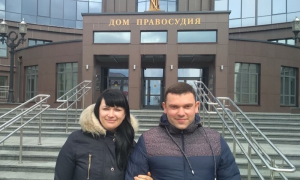Brest Regional Court unconstitutionally rejected an appeal by 21-year-old Jehovah Witness conscientious objector Viktor Kalina against his conviction and large fine for refusing to do military service. The appeal rejection came one week before Belarus’ Alternative Service Law came into force on 1 July.

On 24 June, Brest Regional Court rejected an appeal by 21-year-old Jehovah Witness conscientious objector Viktor Kalina against his conviction and large fine for refusing to do compulsory military service on grounds of religious conscience. The rejection of the appeal came one week before Belarus’ Alternative Service Law came into force on 1 July. The Law for the first time allows an alternative civilian service for some, but not all, conscientious objectors.
With the help of the Belarusian Helsinki Committee, in late July Kalina lodged further supervisory appeals against the decision to the General Prosecutor’s Office and Brest Regional Court (see below).
Kalina was convicted after a second trial in May of violating Criminal Code Article 435, Part 1. This punishes “Refusal of call-up to military service” with penalties of either a fine or up to two years’ imprisonment. The Court fined Kalina 21,000,000 old Belarusian Roubles (currency superseded on 1 July) which is now 2,100 new Belarusian Roubles (about 8,800 Norwegian Kroner, 930 Euros, or 1,050 US Dollars). This represents about 100 days’ average wages in Brest Region, according to June 2016 figures from the National Statistical Committee.
The new trial came after Kalina’s acquittal on the same charges in September 2015, in which a judge noted that he used “his constitutional right to ask for alternative rather than military service which contradicts his ethical and religious views, and he should not bear responsibility for the evasion of military call-up procedures”.
Following the acquittal, the General Prosecutor’s Office filed a protest to the Supreme Court insisting that Kalina’s reasons for refusing military service were not well-grounded. The Court agreed on 18 March 2016, claiming that service in the military Railway Troops is for conscientious objectors. The judges in Kalina’s 2016 second criminal trial and latest appeal insisted against the Constitution and international human rights law that Kalina could serve in the Railway Troops. Kalina commented to Forum 18 that “alternative service exists now, but not for me” (see below).
New Law allows some – but not all – to perform alternative service
Belarus’ first-ever Alternative Service Law took effect from 1 July 2016. It allows some, but not all, young men who are conscientious objectors to perform a civilian alternative service instead of compulsory military service.
Only young men with a religious pacifist objection will be eligible to apply for alternative civilian service, not those with non-religious pacifist convictions. It is unclear whether even all young men with religious objections to military service will be allowed to do civilian alternative service, as the Law is silent on how objectors from communities which are not as a community formally pacifist – such as the Orthodox Church – will be treated. Moreover, civilian service will be twice the length of military service and those undertaking it will be paid less than military conscripts. And if conscripts already doing military service change their beliefs to become conscientious objectors, they will not be eligible for alternative service (see F18News 18 June 2015 http://www.forum18.org/archive.php?article_id=2074).
Kalina’s first trial
The first criminal case opened against Kalina was under Criminal Code Article 435, Part 1 (“Refusal of call-up to military service”) in June 2015. At his trial on 8 September 2015 Brest’s Moscow District Court found the conscientious objector not guilty (see F18News 24 September 2015 http://forum18.org/archive.php?article_id=2104).
Brest General Prosecutor’s Office protested against the District Court’s decision to acquit Kalina. However, on 13 October 2015 Judge Nikolai Shestak of Brest Regional Court confirmed the acquittal, noting that Kalina “uses his constitutional right to ask for alternative rather than military service which contradicts his ethical and religious views, and he should not bear responsibility for the evasion of military call-up procedures” (see F18News 27 October 2015 http://www.forum18.org/archive.php?article_id=2113).
Deputy General Prosecutor’s protest
On 10 February 2016, Deputy General Prosecutor Aleksei Stuk lodged a protest (seen by Forum 18) against Kalina’s acquittal to the Supreme Court. Stuk insisted that laws and facts had been wrongly interpreted in Kalina’s earlier trials. Stuk also claimed that a Constitutional Court decision of 26 May 2000 stated that, at the time when no mechanism existed for substituting alternative for military service, “it should be agreed, considering exceptional circumstances, with the practices of special conditions provided by the relative authorities to allow the citizens to fulfil their duty in a manner which does not violate their religious convictions”.
The May 2000 Constitutional Court ruling (decision R-98/2000) called for the “urgent” adoption of an Alternative Service Law or an amendment to the Law on Military Obligation and Military Service to introduce a mechanism for alternative service. It said that before such legal changes are made, the authorities must allow citizens to perform service “that does not violate their religious convictions”. The Constitutional Court made no reference to refusing military service on non-religious conscientious grounds (see F18News 20 October 2009 http://www.forum18.org/archive.php?article_id=1364).
Supreme Court claims military formation is for conscientious objectors
The Supreme Court supported Deputy General Prosecutor Stuk’s argument in Kalina’s case, stating in its 18 March 2016 decision (seen by Forum 18) that to meet conscripts’ religious needs, the Defence Ministry established the Railway Troops. In this military formation, no oath is required and individuals are exempted from military studies, bearing weapons or overt military equipment, and other military duties against their religious beliefs.
The General Prosecutor’s Office claimed that 240 conscripts whose religious views do not allow them to swear the military oath had been able to serve in the Railway Troops.
Forum 18 notes, however, that the Railway Troops were not specifically created for conscientious objectors, and that they are a military formation and not a civilian body.
Armenia in the past also claimed that service controlled by the military was a form of alternative civilian service. This led to a 7 July 2011 European Court of Human Rights (ECtHR) in Strasbourg judgment in the case of Armenian Jehovah’s Witness conscientious objector Vahan Bayatyan (Application no. 23459/03). The ECtHR ruled that the state’s refusal to offer Bayatyan an alternative to compulsory military service and punishment of him for refusing to serve in the armed forces violated his rights under Article 9 (“Freedom of thought, conscience and religion”) of the European Convention for the Protection of Human Rights and Fundamental Freedoms (ECHR) (see F18News 7 July 2011 http://www.forum18.org/archive.php?article_id=1591).
But unlike Armenia, Belarus is not a member of the Council of Europe so its citizens have not been able to challenge such punishments to the ECtHR in Strasbourg. Despite this, on 27 May 2015 Belarus’ Constitutional Court cited the ECtHR Bayatyan judgement in support of the Alternative Service Law (see F18News 18 June 2015 http://www.forum18.org/archive.php?article_id=2074).
After the ECtHR judgment, in 2013 Armenia introduced a genuine alternative civilian service (see F18News 28 November 2013 http://www.forum18.org/archive.php?article_id=1901). This has since been functioning without problems.
International human rights obligations
The legal analysis prepared by the Belarusian Helsinki Committee for Kalina’s latest 2016 appeal, seen by Forum 18, pointed out that both United Nations Commission on Human Rights resolution 1995/83 [see http://www.wri-irg.org/node/9174], and a Council of Europe Parliamentary Assembly report of 13 July 2000 [Document 8809 http://www.assembly.coe.int/nw/xml/Xref/X2H-Xref-ViewHTML.asp?FileID=9017&lang=EN], both state that alternative service should not be performed in any service connected with the military.
The legal analysis also cites the May 2000 Constitutional Court ruling that the authorities must allow citizens to perform service “that does not violate their religious convictions” (see F18News 20 October 2009 http://www.forum18.org/archive.php?article_id=1364).
The right to refuse to perform military service is part of everyone’s right (whether or not they hold a religious belief) to freedom of thought, conscience and religion guaranteed in Article 18 of the International Covenant on Civil and Political Rights (ICCPR). Belarus ratified the ICCPR in 1976. This is stated in General Comment 22 on Article 18 of the ICCPR, by the United Nations (UN) Human Rights Committee. International human rights law rulings have repeatedly underlined this (see a personal commentary, by Derek Brett of Conscience and Peace Tax International, on conscientious objection to military service and international law at http://www.forum18.org/Archive.php?article_id=1597).
Until now Belarus – like Azerbaijan (see eg. F18News 20 January 2016 http://www.forum18.org/archive.php?article_id=2140), Turkey (see eg. F18News 1 May 2012 http://www.forum18.org/archive.php?article_id=1696), Turkmenistan (see eg. F18News 5 July 2016 http://www.forum18.org/archive.php?article_id=2196), and the unrecognised entity of Nagorno-Karabakh (see eg. F18News 10 November 2014 http://www.forum18.org/archive.php?article_id=2014) – has prosecuted and jailed conscientious objectors to military service.
Any military service unacceptable on principle
Conscientious objector Kalina explained to Forum 18 on 26 July 2016 that service in the Defence Ministry’s Railway Troops is unacceptable for him as he wants to follow the principle “not to bear weapons and to have absolutely nothing to do with military organisations”.
Deputy General Prosecutor Stuk claimed in his appeal that “Kalina’s stated wish for alternative rather than military service, while legally not brought under the regulation on the date of 20 May 2015, cannot be judged as a good reason for his evasion of call-up procedures”. He pointed out that Kalina “did not exercise his right to appeal against the Conscription Commission’s decision [to send him to the army] which would have suspended its execution”.
Kalina explained to Forum 18 that he had not lodged an appeal because of his lack of experience and knowledge of how to exercise his right to appeal.
Forum 18 was unable to find out why the General Prosecutor’s Office pursued the case against Kalina, given that the Alternative Service Law was due to come into force on 1 July 2016, less than five months later. The office secretary refused to put Forum 18 through to Deputy General Prosecutor Stuk or any other prosecutor. “You won’t be able to talk to anyone. We don’t give phone numbers of prosecutors, but if you have objections or complaints about your case you can submit them in writing,” she explained on 2 August, before putting the phone down.
Kalina’s second trial
Following the Supreme Court’s March 2016 decision to overturn Kalina’s original acquittal, the case returned to Brest’s Moscow District Court for a second trial. Kalina was again charged under Criminal Code Article 435, Part 1 (“Refusal of call-up to military service”). On 18 May Judge Mariya Levanchuk convicted Kalina and fined him 21,000,000 old Belarusian Roubles (now 2,100 new Belarusian Roubles).
Kalina told Forum 18 that, for him, the fine represents a considerable amount of money. He estimated that it will take him about two years to pay the fine.
Judge opposes Constitution
Judge Levanchuk claimed that Kalina committed his “crime” deliberately, as he attended all the call-up procedures. The Judge focused on the 1992 Military Service Law insisting that “all male citizens are obliged to undertake military service whatever their origin, social and financial status, national and racial identity, education, religious belief, profession, political and other opinions”. Judge Levanchuk thus set her own ruling above Article 57 of the Constitution, which provides for alternative service (see F18News 20 October 2009 http://www.forum18.org/archive.php?article_id=1364).
For Kalina this second criminal trial and its 18 May verdict were “absolutely unexpected”. He complained to Forum 18 that the hearing, although open to the public, was held in a small office because the court room was occupied. The room could contain only two of his witnesses, but not 20 of his fellow-believers who came to support him.
This is not the first time Belarusian officials have in court publicly ignored their own Constitution. Lieutenant Colonel Vladimir Osipov of Rechitsa Military Conscription Office on 29 January in Rechitsa District Court described the Constitution as “nonsense” and international human rights treaties as “not important” (see F18News 5 February 2016http://www.forum18.org/archive.php?article_id=2146).
Forum 18 called Moscow District Court on 2 August to ask Judge Levanchuk why her decision opposed previous court verdicts, and why the Military Service Law should prevail over the Constitution. The Court’s secretary claimed to Forum 18 that the Judge is on holiday.
Appeal rejected
On 24 June a panel of three Judges at Brest Regional Court, chaired by Judge Svetlana Kremenevskaya, rejected Kalina’s appeal against the conviction and fine. The decision, seen by Forum 18, claimed that Kalina was unable to give good reasons for refusing to serve in the Railway Troops. The court concluded that Kalina committed the “crime” “with direct intention”.
Asked on 2 August what reasons would be seen as sufficient to exempt a conscientious objector from serving in the Railway Troops, Judge Kremenevskaya refused to answer. “What right do you have to ask me questions, and what right do I have to discuss the case with you when you are not involved?” she asked Forum 18. She added that the decision was taken by the panel of judges. “We received a supervisory appeal and all the facts will be re-examined and checked,” she maintained.
“Alternative service exists now, but not for me”
Kalina told Forum 18 that at both hearings the Judges ignored his appeals to give him a chance under the Alternative Service Law taking effect on 1 July. “I don’t understand this system, as originally I was found not guilty and then – after being charged under the same Article in the same court – they took the absolutely polar-opposite decision,” he lamented. “It’s beyond my comprehension that alternative service exists now, but not for me.”
Dmitry Chernykh of the Belarusian Helsinki Committee says that the court referred to the fact that the Alternative Service Law was not in effect at the moment when Kalina’s “crime” was committed. “We are going to submit supervisory appeals to the General Prosecutor’s Deputy and to Brest Regional Court,” he told Forum 18 on 25 July.
Kalina has asked to postpone the fine payment until he goes through all possible protests and appeals. On 25 July he lodged a supervisory appeal to the General Prosecutor’s Office and on 29 July to Brest Regional Court. He hopes that the verdict will be overturned as the Alternative Service Law is already in force, “if not I’ll abide by the court’s decision,” he told Forum 18.
The punishment also suspends Kalina from military service for two years, the period over which he may pay the large fine. Asked if he expects any call-up notifications soon, Kalina explained that he is a “criminal” now and after paying the fine he expects that he will be conscripted again for military service. “Only this time I’ll have a chance to do it in the civilian sector, although it will last for three years. I am all in for it, both paying the fine and also having alternative service for three years!” he remarked bitterly.
Will acquitted conscientious objector face new call-up?
Another acquitted Jehovah Witness, Dmitry Chorba from Rechitsa in Gomel Region, told Forum 18 on 9 July that he expects his conscription notification in August. “I’ll start to undergo the medical commission and if I’m fit for the service on my request my documents will be forwarded to the Labour Ministry for alternative civilian service,” he explained to Forum 18.
In his most recent case, Rechitsa District Court acquitted Chorba on 29 January 2016 of charges under Administrative Code Article 25.1, Part 3, which punishes a conscript for not responding to a Military Conscription Office call without good reason (see F18News 5 February 2016 http://www.forum18.org/archive.php?article_id=2146).
Since 2000, several other conscientious objectors to military service have been tried and convicted for their “crime”. These include Jehovah’s Witness Dmitry Smyk, Messianic Jew Ivan Mikhailov, non-religious pacifist Yevhen Yakovenko, and non-religious pacifist Andrei Chernousov (see Forum 18’s Belarus religious freedom survey http://www.forum18.org/archive.php?article_id=1997). Chernousov was forcibly confined to a psychiatric hospital for five days in 2012 to establish if his convictions leading him to refuse call-up accorded with “norms of psychiatric health” (see F18News 4 May 2012http://www.forum18.org/archive.php?article_id=1697). (END)



